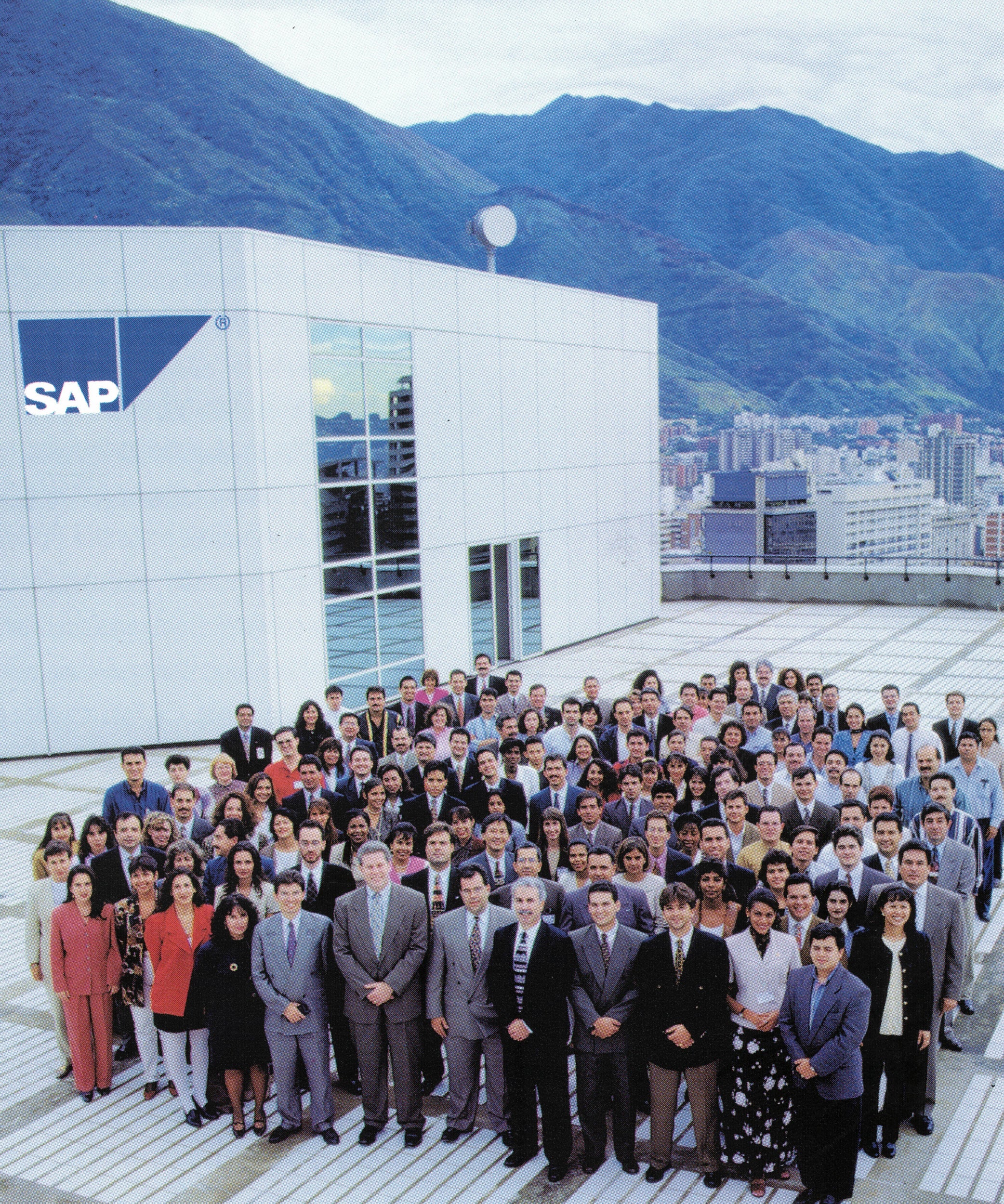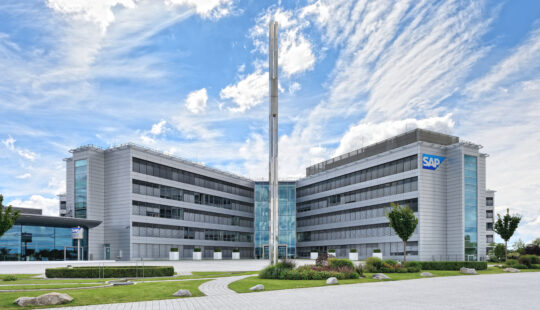Doing business successfully in Latin America requires pragmatism, staying power, a good team, and nerves of steel. That was as true in the 1990s as it is today.
The festive season of 1994 was far from joyful for the Mexican government and officials at the Mexican central bank. On December 20, the Central American nation’s authorities were forced to devalue the peso by around 15% against the dollar because Mexico could no longer maintain the peso’s fixed exchange rate against the U.S. currency. The immediate consequence was a massive flight of foreign capital from Mexico. This hit domestic companies hard and ultimately resulted in a financial crisis that sent shock waves across Latin America.
Only months earlier, in April 1994, SAP had founded its first subsidiary in Latin America, its 19th worldwide, in Mexico. Suddenly, recalls Maricarmen Ortiz, the fledgling SAP subsidiary found itself in the midst of what later became known as the “Tequila Crisis.”
Mexico-born Ortiz had transferred from IBM in September to work as a consultant at SAP. Her job now — along with the then president of SAP Mexico, Raul Véjar, and their 15 colleagues — was to convince cash-strapped Mexican companies that it “made sense, particularly in times of crisis, to invest in software as a way of gaining competitive edge,” says Ortiz.
This was not the only economic and political crisis that SAP employees have faced — and survived — since the company took its first steps in Latin America.
Political and Economic Crises
Tariff conflicts, nationalization, rapidly changing governments, financial and currency crises: “There’s always something happening,” says James Gunn, an American who joined SAP as a controller for the Latin America region in June 1997 and is now in charge of strategic finance projects in the global Finance & Administration Board area. “Instability became a constant. Our job, as ambassadors for the region, was to explain to SAP management in Walldorf what key challenges each country faced and what we were doing to ensure we would still reach our targets.”
Which in most cases they did, as Peter Rasper acknowledges. Rasper, who left his role as head of Global Finance Infrastructure to take early retirement in 2019, set up country controlling in North and South America in the mid-1990s. Often, figures were not supplied until the very last minute – just like in other regions, he says. And there were salespeople who excelled at stashing contracts away and then suddenly pulling them out of the drawer when they were needed. But his colleagues in Latin America always acted “in the right spirit,” says Rasper, “and showed pragmatism, improvisation, and entrepreneurial flair in making the best out of what were often difficult circumstances.”
Gunn agrees. One of the many things that impressed him was the extremely high standard of English spoken by the colleagues with whom he had dealings in Latin America. “I also think it’s remarkable how the folks there have managed to navigate our company safely through so many storms,” he says.
Team Spirit and Customer Focus
As well as having an outstanding product that was for the most part adapted to local requirements early on, various factors were, and still are, pivotal to effective crisis management. Three are among them.
The first is unshakeable team spirit. “There weren’t many of us in the early days. We had to take care of everything, and we all helped each other,” remembers Lorena Dames, who joined SAP in Argentina in July 1994 and is now COO for SAP Customer Experience in Latin America. “Consultants gave demos and provided support; employees from the legal department explained the product and signed contracts. We were a tight-knit group – all fairly young – and SAP gave us the chance to forge close personal ties that have seen us through thick and thin.”
Those ties spanned both team and national boundaries. When new subsidiaries opened, employees from existing ones helped out, recruited new people, set up processes, and shared the lessons of their own experience.
Thomas Hanser agrees with Dames. “Helping each other is part of Latin American culture,” says the IT specialist, who set up the infrastructure in Brazil and at many other SAP subsidiaries. “And that, in my view, has been part of SAP culture from day one. We see ourselves as part of a greater whole; we help each other achieve common goals; and we learn and grow together.” That’s still the case today, says Brazil-born Hanser, whose grandparents emigrated from Germany to Brazil and who today is responsible for global IT services outsourcing at SAP.
The second factor is unconditional customer focus. There is no question that SAP has the best people and the best solutions, says Ricardo Avila. But, adds Avila, who comes from Venezuela and joined the legal department at SAP in 1996, what really got the company safely through all the crises was its “customer-first attitude” and its readiness to be open and frank with clients. “If a certain function wasn’t available yet, or parts of the software weren’t yet localized, we told the truth and promised to deliver the functions in a couple of months. And we kept those promises,” says Avila.
But disputes couldn’t always be avoided, if, for example, customer expectations went beyond what SAP’s resources could deliver.
Don’t Let Customers Down
Gerd Bizer remembers just such a situation: “I took over the localization project for Argentina in mid-1996. A meeting took place at which the representatives of the Argentinean user group spent two hours dressing us down, shouting at us, and calling us fraudsters. Once we had cleared up the misunderstandings, we quickly became the best of friends. That’s when I learned what a huge part emotion plays in Latin America,” says Bizer, who took early retirement in 2019. Within a few months, the “dust had settled,” he says, and the customers were happy.
Things can’t always go smoothly though, because every project poses its own particular challenges, says Rasper. Nevertheless, as it expanded across Latin America, SAP earned a reputation for never letting customers down and for always finding a solution when problems occurred.
Such as during the economic and financial crisis of 2001 in Argentina. Jorge Schiavo remembers SAP freezing maintenance costs for customers in financial difficulties. “It was our way of doing something to protect businesses and their employees,” says Schiavo, who became the 12th member of SAP’s team in Argentina when he joined in 1995. “We also introduced special measures to ensure that none of our employees lost money as a result of devaluation and high inflation,” adds Schiavo, who continues to contribute his financial expertise and his experience with Argentinean tax law, as well as optimizing global and regional financial processes.
The third key factor in effective crisis management in Latin America, says Peter Rasper, is the fact that “we have never – to my knowledge – closed a location there.” It wasn’t always possible to avoid redundancies, he admits, but SAP operated on the principle of never letting its customers down and of keeping a strong team available locally.
Difficult Situation in Venezuela

At least until Venezuela’s economy collapsed, that is. The dire political and economic situation prevailing in Venezuela pushes even SAP to its limits, a realization that saddens many “first-generation” employees in Latin America.
“When I was a consultant, we always said that the country’s rich oil reserves would save oil companies from ever going bust,” says Francisco Fernandez, who was there when SAP opened its offices in Caracas in 1996. “And where are we now?”
In the 1990s, SAP served all of Central America, the Caribbean, and northern South America out of Venezuela. “I can’t begin to tell you how many flights left Caracas every Monday with SAP consultants on board heading to neighboring countries,” says Fernandez. “Venezuela was way ahead of other countries.”
“We’ve had to move most of our people to other locations,” says Ricardo Avila. “And SAP is serving its Venezuelan customers out of other countries now too.”
But the principle remains: “No matter how dire the crisis in Latin America,” says Avila, “we’ll remain pragmatic and optimistic. And we won’t let our customers down. Our commitment is to them, to the region, and to our colleagues.”



